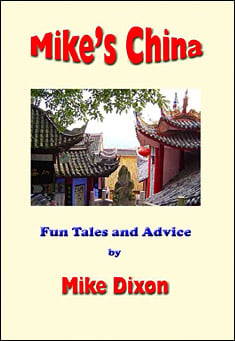Fun tales and travel tips for the independent traveller to China. Lots of pics.
Excerpt:
There was a time when tourists needed to join a group or hire a guide to visit China. Those days have gone but the myth remains. Part of the problem is the description that is often applied to the country.
We're still told that China is an emerging economy. This gives the impression of inadequate transport, substandard accommodation, poor sanitation and all those other things associated with the "underdeveloped world".
Admittedly, there are regions of China that are still "emerging". Others have most definitely "emerged". It would be no exaggeration to say that there are as many people in China with a comfortable standard of living as there are in Western Europe or the USA.
What's more, the housing and public amenities, in those parts of China that have "emerged", are newer and more modern than in Europe and America. The parts I am talking about are mainly on the coast. There is still a big east- west divide in China.
You can, of course, join a group to visit Beijing and Shanghai or tour the picturesque towns along the Grand Canal. But there's no need. The whole eastern region of the country is well equipped to receive tourists. Most tourists are Chinese but a fair sprinkling come from outside the country. Since you are reading this, I can safely assume that you speak English. The Chinese have an amazing ability to learn foreign languages and English tops the list. You won't have too much trouble finding someone who can understand you. My frustration has been in trying to practise my limited Chinese. Too many people want to practise English.
You will find all sorts of accommodation from five-star to no-star. It's amazing just how little impact communism has had on the deeply ingrained Chinese desire to do business. Go north into the former Soviet Union and you will see what I mean.
The metro system in the big cities is modern, safe and easy to use. Place names are given in both Chinese characters and Roman (ABC). Information boards and public address systems provide advice in Mandarin (official Chinese) and English. Intercity trains are modern and run on time.
The Chinese are exceedingly sociable. They are used to meeting people who don't speak their own language since China has a huge number of different languages (like Europe).
At daybreak, you will find people in the parks practising their early morning exercises (young and old) or jogging (young). In the evenings many people eat out rather than cook at home. There is a marvellous hustle and bustle. Take the usual precautions when in a big crowd. China is a fairly safe place for travellers but has its problems like everywhere else.
In other stories I talk about travelling out West in China. Things are different there. You may need a permit to visit certain places and it may be advisable to have a guide.
There are 1,300 million of them and they're all called Chinese. The European Union has a third that number. They are all called Europeans but no one expects them to be the same. We recognise that Bulgarians are different from Spanish and Italians from Danes. The same goes for China. Thirty percent of the population is officially recognised as belonging to minority groups. In Britain they would be called nations (English, Scots, Welsh). The rest of the Chinese population is classed as Han.
Don't think of the Han as being all the same. For starters, they don't all speak the same. The Shanghai "dialect" is as different from the official Beijing "dialect" (Mandarin) as English is from broad Irish or Scots. Cantonese, sounds so different that even foreigners can tell it apart from Mandarin.
The big unifying factor is writing. Most Chinese characters do not spell out sounds. They convey meaning (like our traffic signs). As a consequence, people with totally different languages can communicate through writing. You will see Chinese handing one another writing pads. They're not asking for an address. They want the other person to write down what they are saying so they can understand.












